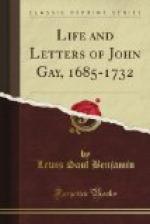It was not Bolingbroke who inspired the pastorals, though he accepted the dedication. The true history of the origin of “The Shepherd’s Week” is well set out by Mr. Underhill. “These pastorals, it should be explained, were written at the instigation of Pope,” he has written. “The sixth volume of Tonson’s ‘Miscellany’ had concluded with Pope’s Pastorals and begun with those of Ambrose Philips. A few years after its publication a writer in the Guardian[1] (probably Tickell[2]) discussed the Pastoral in a series of papers, and gave the most extravagant praise to Philips. ‘Theocritus,’ he remarked, ’left his dominions to Virgil; Virgil left his to his son Spenser; and Spenser was succeeded by his eldest born, Philips.’ Pope was not mentioned, and he set himself to redress the injustice by a device of characteristic subtlety. He wrote a sixth paper, in which he continued to illustrate the true principles of pastoral poetry from Philips’ practice, but in such a way as to show the judicious reader by the examples given either the absurdity of Philips or the superior merit of Pope. The article was anonymously or pseudonymously forwarded to the Guardian, and was in due course published. Philips was furious, and providing himself with a birch rod, threatened to flog Pope. The latter, not content with his ingenious revenge, prevailed upon his friend Gay to continue the warfare and to burlesque Philips’ performances in a series of realistic representations of country life."[3] Gay entered into the sport with joy—it was a game after his own heart, and one for which his talent was particularly fitted. He begins his “Proeme to the Gentle Reader” with a most palpable hit: “Great marvel hath it been (and that not unworthily) to diverse worthy wits, that in this our island of Britain, in all rare sciences so greatly abounding, more especially in all kinds of poesie highly flourishing, no poet (though other ways of notable cunning in roundelays) hath hit on the right simple eclogue after this true ancient guise of Theocritus, before this mine attempt. Other Poet travelling in this plain highway of Pastoral I know none.” Presently comes an attack but little disguised on Philips: “Thou will not find my shepherdesses idly piping on oaten reeds, but milking the kine, tying up the sheaves, or if the hogs are astray driving them to their styes. My shepherd gathereth none other nosegays but what are the growth of our own fields, he sleepeth not under myrtle shades, but under a hedge, nor doth he vigilantly defend his flocks from wolves, because there are none, as maister Spenser well observeth:—
Well is known that since the Saxon King
Never was wolf seen, many or some,
Nor in all Kent nor in Christendom.”




